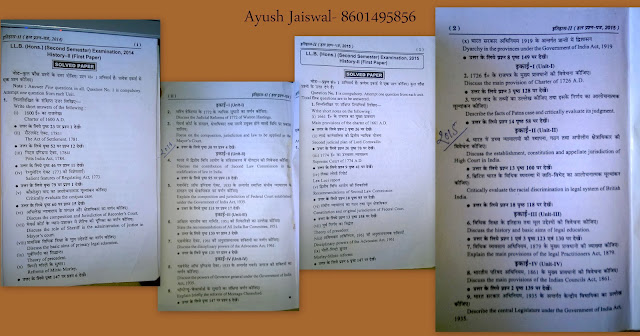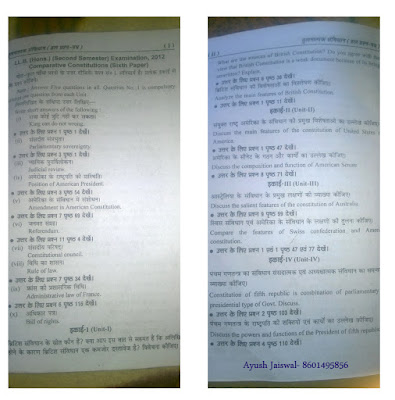Thank You Shriram..
Showing posts with label Question Papers of Lucknow University. Show all posts
Showing posts with label Question Papers of Lucknow University. Show all posts
09/11/2017
28/09/2017
LL.B (HONS.) 2nd Semester 2016 Paper
History – II (First Paper)
1. Write Short notes on the following :
(1) Charter of 1600 A.D.
(2) The Act of settlement, 1781
(3) Pitt’s india
(4) Doctrine of equity,justice and good conscience in English Law.
(5) Basic aims of primary education.
(6) Salient feature of Regulating Act,1773
(7) Judicial plan of 1772.
(8) State Bar council.explain its functions
(9) Demerit of the charter of 1753.
(10) Establishment of Provicial Autonomy under the Government of India
UNIT- I
2. Describe the facts of Raja Nand Kumar case and critically evaluate its judgement
3. Discuss the early administration of justice of Madras Presidency.
UNIT – II
4. Focus on the first Law-commission in India
5. Discuss the Development of civil law in Presidency towns and mufassil areas.
UNIT-III
6. Discuss the main provisions of legal practioners Act,1879.
7. State the recommendations of All India Bar committee,1951.
UNIT-IV
8. State the main features of Indian councils Act,1892.
9. Explain briefly the Reforms of montagu-chelmsford.
SOCIOLOGY – II ( Second Paper)
1. Write Short Answers of the following :
(1) Review the main features of vedic society in India
(2) Examine the sociological importance of Sanskars in Hindu Method of life.
(3) Discuss the first two spans of Ashrama Vyavastha.
(4) Explain the main features of Joint family system in India
(5) Distinguish between Caste and Class.
(6) Differentiate between Rural and Urban mode of life.
(7) Examine the momentum of women impowerment in India
(8) Explain the concept of Werternization.
(9) Discuss the impact of Globalization on India
(10) Explain the views of M.N. Srinivas on the concept of Sanskritization.
UNIT- I
2. Examine the impact of British administration on contemporary Indian society in post-Vedic period.
3. “Indian culture is a symbol of unity in diversity” Review this statement with examples.
UNIT – II
4. What is social stratification?Discuss its traditional basis.
5. Define caste. Throw light on its merits and demerits.
UNIT-III
6. Discuss the socio-cultural problems of Indian tribes and suggest measures to solve them.
7. What do you understand by minority group?Discuss the main problems faced by Christians in India
UNIT-IV
8. Define modernization and discuss the factors conducive for its popularity in Indian society.
9. Evaluate the trends of social change from tradtion to modernity in Indian frame of reference.
ECONOMICS – II ( Third Paper)
1. Explain briefly the following :
(1) Concepts of M1,M2,M3 and money multiplier .
(2) Difference between National income and personal income.
(3) How you will get the net National product at factor cost when gross domestic product at market price is given.
(4) Main functions of Reserve Bank of India.
(5) Deficit in current Account.
(6) Fiscal Responsibility and budget management Act.
(7) Arguments in favour of free trade.
(8) Selective credit control.
(9) Role of finance commission in India.
(10) Objectives of Fiscal policy in a developing economy like India.
UNIT- I
2. Differentiate between demand pull inflation and cost push inflation.Suggest measures to check inflation in an economy.
3. Discuss the role of effective demand in determining the level of employment in Keynes employment theory. How the low level of effective demand is a prime cause for unemployment as per Keynes theory of employment?explain.
UNIT – II
4. Explain the various measurements of fiscal imbalances shown in the Union budget.Throw the light on estimates of these imbalances in the budget 2015-16 and 2016-17 also.
5. What are the causes of mass poverty in India.Critically evaluate the strategy of the Government to remove poverty from the country.
UNIT-III
6. Explain various concepts of terms of trade.Analyse the factors which determine the terms of trade of a country.
7. Discuss the objectives of exchange control.Explain the various methods of exchange control also.
UNIT-IV
8. Write an essay on the priorities,strategy and progress of Twelth five plan of India.
9. “Indian economy is the fastest emerging economy of the world.”Point out the structural changes in Indian economy since independence especially after the introduction of of economic reforms in context to the above statement.
POLITICAL.SCIENCE – II ( Fourth Paper)
1. Write short notes on the following :
2. Write an essay on the ‘Ideal state’ of Plato.
4. Describe about John Locke as a ‘Social Contract Thinker’.
6. “Machiavelli is fore-runner of modern political thought”.Examine critically.
8. Explain in your own words about virtues and duties of the Divine King as described by Acharya Manu.
PSYCHOLOGY -II Sem ( Fifth Paper)
1. Write short answer to the following :
(1) Feedback
UNIT- I
2. What is effective communication?Describe its process.
UNIT – II
4. What is interview?Describe its various types.
UNIT-III
6. Elucidate the concept of legal counselling.How does it differ from general counselling?
UNIT-IV
8. What do you understand by deductive and inductive reasoning?Bring out difference between the two.
1. Write short notes on followings :
(1) Constitutional Conventions.
(2) The Crown.
(3) Popular Sovereignty.
(4) Marbury V. Madison.
(5) Congress of the United States of America .
(6) Constitutional Council of Fifth Republic.
(7) French Legal system.
(8) Swiss confederation.
(9) Referendum.
(10) The Canadian constitution Act 1982.
UNIT- I
2. What do you understand by Cabinet System?Discuss the functions of Cabinet in British system.
3. Discuss the Sources of British Constitution.
UNIT – II
4. Explain the features of the presidential type of Government and the position of President of America in such system .
5. Discuss the Functions and powers of the Congress.
UNIT-III
6. Explain the important features of the Constitution of the Switzerland.
7. Point out the distinctions between swiss and American Constitution.
UNIT-IV
8. Explain the powers of the President of the Fifth Republic.
9. The Parliament of the Fifth Republic is ‘Rationalized Parliament’.Comment.
Subscribe to:
Comments (Atom)
Mivi Collar Flash Bluetooth Earphones. Fast Charging Wireless Earphones with mic, 24hrs Battery Life
https://amzn.to/3zRbxXu














































